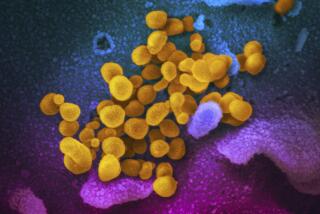Targeted shots
The failure of a promising AIDS vaccine -- which not only didn’t prevent HIV infection but may have increased susceptibility to the virus -- led to two conflicting calls for action, neither of which got it right. Recipients of grants wanted the vaccine search to go on as before; treatment activists wanted the money stripped from research. The National Institutes of Health appeared to be taking a wiser approach after a conference last week, saying it would continue funding vaccine research. But it is likely to focus on basic research and smaller, less expensive trials.
AIDS is a particularly challenging disease for vaccine research. The virus that causes the disease attacks the immune system, which most vaccines employ to fend off disease. It mutates far more quickly than the flu. There are no people with natural immunity. Little surprise, then, that two big trials of vaccines ended with hopes dashed -- the more recent in September, when researchers called off an international study of a vaccine by drug giant Merck. A third trial, costing more than $100 million, is underway in Thailand. A fourth was about to start.
Leaders of the AIDS Healthcare Foundation, based in Los Angeles, lost little time after the Merck trial was halted in calling for vaccine funding to be rerouted to treatment and prevention. But U.S. funding for AIDS vaccine research, less than $700 million a year, is a relative pittance compared with that for treatment and prevention, which stands at more than $15 billion annually and is expected to at least double in the next year.
Because drugs have considerably lengthened the lives of AIDS patients, it’s too easy to forget that people can develop resistance to them and suffer significant side effects. The research effort that brought about these treatments was a tremendous achievement, but scientists still have much to learn about the virus.
It made sense to start the vaccine effort with big clinical trials that, if successful, would have led quickly to drug licensing. The need for a vaccine was urgent. Now, however, we know that these trials cost too much and take too long. The NIH should continue with the fourth vaccine trial but reduce its scope. Agency officials are right to say that the best future for an AIDS vaccine lies in the laboratory and in narrower trials that can point to the most promising paths while they add to our knowledge of the disease.






